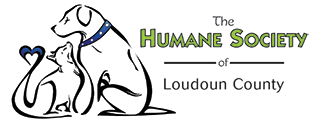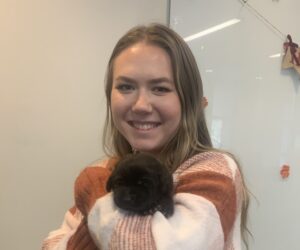
By Lauren Puckett
Did you know that performing an act of kindness actually ignites a chemical response in your brain? That’s the positive feeling you get when you do something for someone else, and it’s been coined the “helper’s high.” Beyond the momentary euphoria you enjoy, greater health and increased longevity have also been associated with this psychological state.
Here are four ways you can do a good deed (or two!) for the Humane Society of Loudoun County (HSLC) and get your own helper’s high in the new year!
DONATE
At HSLC, we are not funded by any county, state, or federal organizations. Our work is only made possible because of donors like you. Your tax-deductible donations make things like this possible:
- $20 provides two pet food kits for families in need, or two community cats enough kibble for a month
- $50 vaccinates an animal for rabies or provides five pet food kits for families in need
- $75 covers a sick exam for a foster animal
- $200 provides 20 pet food kits for families in need
- $1,000 covers the average medical cost for a foster animal (in 2022).
In addition to providing financial support, you can donate an item or two from our various wish lists. In-kind donations from these lists help to lower our operating costs, freeing up funds to save more animals.
Dig Deeper
For more information, read “When you donate, where does your money go?”
VOLUNTEER
As a volunteer-based organization with no paid staff, HSLC relies on volunteers to carry out our life-saving mission. We need many folks focused on animal care, of course, but we also need volunteers to cover the business side of the organization: finance, technology, fundraising, marketing, events and administration. Our immediate needs include fosters and volunteers to support our expanding dog foster program.
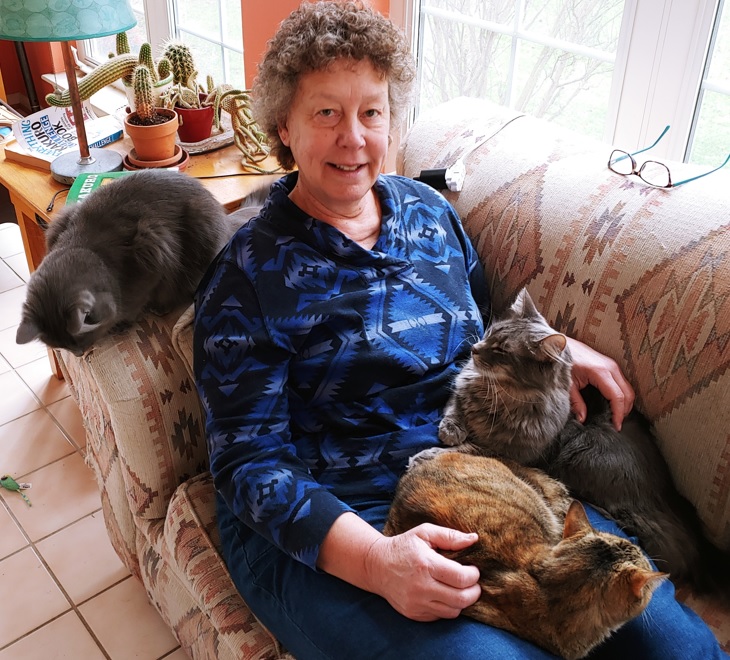
FOSTER
As a foster-based organization, we do not have a physical shelter. We can only save animals when we have a foster home to place them in. Foster families provide a healthy and safe environment for the animal. Fostering increases the animal’s chances of being adopted and helps them overcome the stress of being abandoned in a shelter. When you open your heart and home to an animal in need, you are giving them a second chance at life. Types of fostering include:
- Regular fostering
- Vacation fostering
- Emergency fostering
- Short-term fostering
- Special needs fostering
To become a foster, please complete an online application.
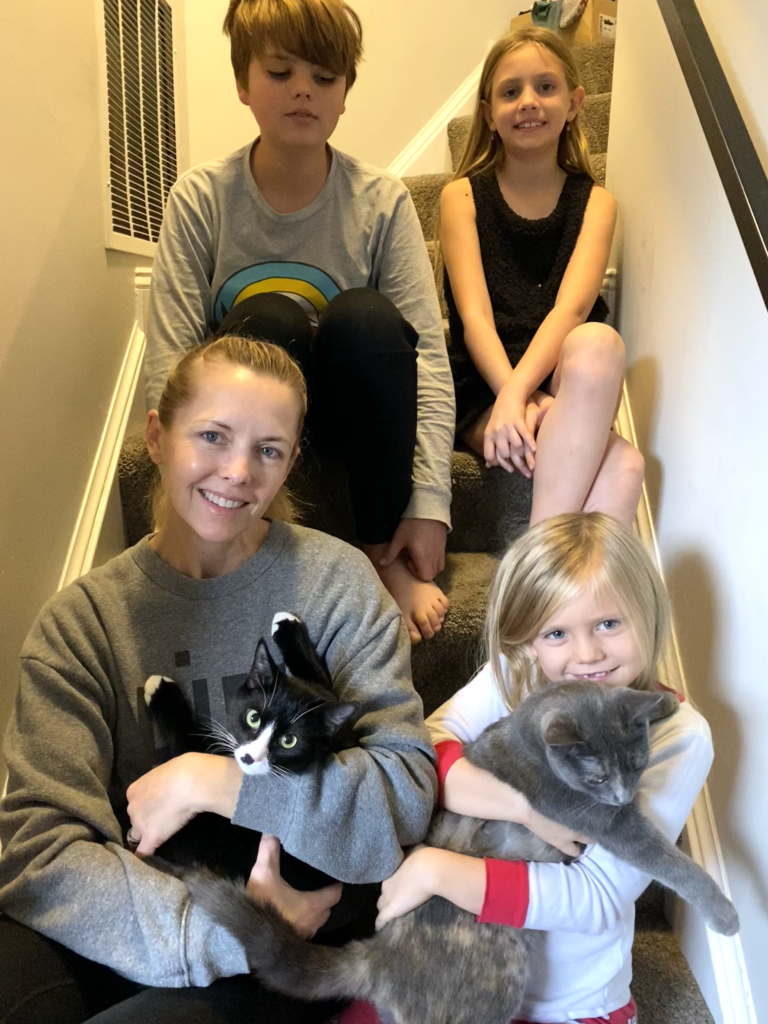
ADOPT
Each year, shelters and rescue groups take in millions of cats and dogs nationwide. “Moving” and “landlord issues” are the top reasons people give up their pets. This means organizations like HSLC have dozens of animals in their care who are anxiously waiting to meet their forever families. We hope that HSLC will be your first choice when choosing a companion animal. All pets adopted through HSLC come with the following benefits:
- Spaying or neutering at the appropriate age (even if it’s after adoption)
- Current on their vaccinations
- Microchipping
- A lifetime of post-adoption support
- Information about the animal’s behavior in a foster home environment
If you are interested in adopting, be sure to check out our available animals!
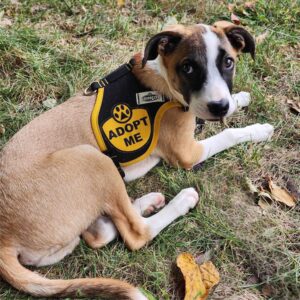
By Liz Bresnahan
As an entirely foster-based organization, the number of animals the Humane Society of Loudoun County (HSLC) can accept is completely dependent on the number of foster homes we have. Currently, HSLC has a very limited number of dog foster caregivers. But, Amy Richards would like to change that. As HSLC’s Animal Care Director, here is Amy’s vision for what an ideal dog foster program would look like.
Strength in Numbers
Amy understands how important it is to have a deep bench of fosters. Having an extensive foster network would ensure that a safe landing is always available when HSLC is asked to take in an animal in need. While long-term fosters are crucial, vacation fosters are also essential as they can step in and support whenever a long term foster is out of town or in case of an emergency.
Transport
Sometimes dogs come to HSLC from out of the county and even out of state. In those cases, we need volunteers who are willing to drive to the dog, either at its original location or at a mid-way point if the other rescue/shelter can arrange a transport volunteer on their end.
Additional Help
Before a dog arrives in the foster home, Amy would like them to be assessed by one of HSLC’s vet partners, and/or a trainer or behaviorist if applicable. That way, Amy can pair the animal with a foster who is best able to meet the dog’s specific needs and set the animal up for a successful adoption.
Resources
While HSLC covers all medical costs, it relies on the foster to provide food, crates, grooming supplies, etc. If the community donated these resources, this would allow the foster family to focus solely on taking care of their foster animal. Additionally, Amy would hope to have enough funding for training and boarding for the foster dogs when necessary.
Dog Foster Coordinator
As the dog foster program grows, Amy would foresee needing additional support to manage the details and day-to-day needs of the fosters and any emergencies that arise. As part of the coordinator role, this individual would also organize outings for the dogs, such as group walks and playdates, to help with socialization and train new foster caregivers.
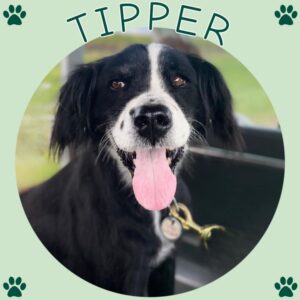
At HSLC, we hope that Amy’s vision of a comprehensive dog foster program can someday be a reality. It would allow us to be able to support more dogs like Tipper who was recently rescued. He is a senior dog who was surrendered by an elderly owner who could no longer care for him. When he came into HSLC’s care, it was clear that he needed significant grooming and medication to treat Lyme disease and Anaplasmosis. He’s all cleaned up now and anxiously waiting to find his forever home. Be sure to check out his bio!
If you are interested in learning more about becoming a dog foster or feel inspired to contribute to HSLC’s foster program in other ways, please contact foster@humaneloudoun.org.
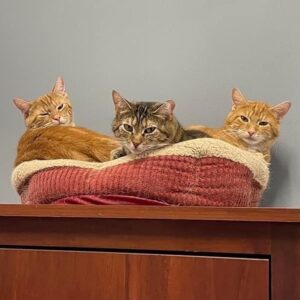
By Lauren Puckett
In August 2021, Tracy Mathews was driving along one early morning in Purcellville when she thought she saw cats in the woods on the side of the road. Upon investigating further, the TNR and Animal Care Administrator for the Humane Society of Loudoun County (HSLC) found several cats hanging out in the bushes. Thankfully, Donna Drake, a former HSLC volunteer and board member, was able to humanely trap the kitties so they could be properly assessed. (For more backstory, read Destiny Can Win Again.)
Tracy took in three of the cats who were healthy and huddled together. Dubbed the Cats of Purrville, she gave the trio a safe landing in the feral kennel at her farm. There, she quickly determined that the cats were very shy but social, so likely adoptable. However, they did not show well at adoption events because they were so scared.
The Purr-fect Adopter Comes Along
Tracy fostered Morris, Myrna, and Felix, for 16 months before a potential adopter, Robin, came calling. During the meet-and-greet, the cats immediately went into hiding when Robin came into the room. But, she trusted that they would warm up to her. Robin originally came to meet just Morris and Myrna but decided that she couldn’t bear to leave Felix behind – so she adopted all three cats!
“Having a bonded trio of adult cats adopted together is unheard of!” according to Tracy. She goes on to say, “Robin has made such a huge impact in their lives.” Since they have been adopted, the three cats have gained confidence and now rule the house. While they are still not lap cats, they are thriving in a loving home.
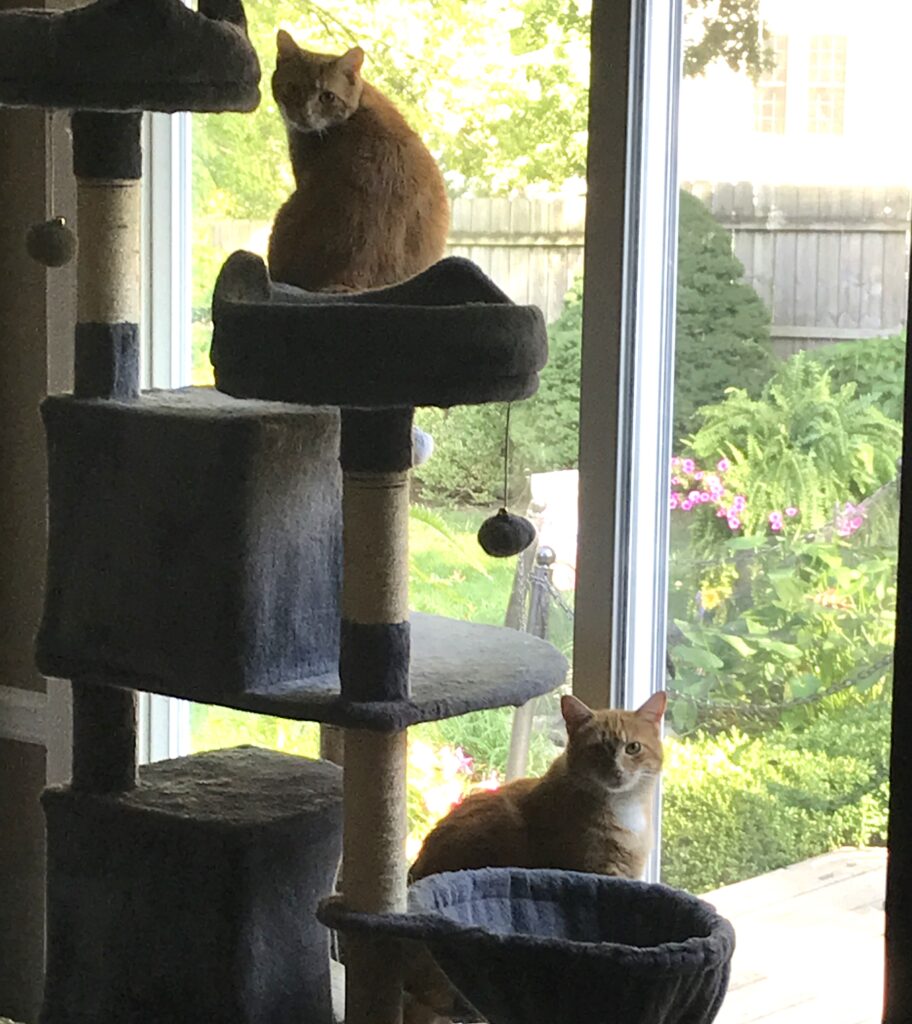
“Everything is going well,” Robin says. “Morris always desires attention and pets. Felix is coming along nicely and allows you to pet him. Myrna is emerging as the ring leader and at times it seems she tells the two boys what to do.”
Looking to adopt a pair of cats? Check out the available animals on the HSLC website.
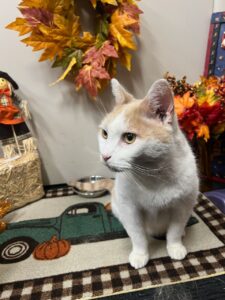
By Lauren Puckett
Three years ago, Rocio, a volunteer trapper and foster for the Humane Society of Loudoun County, found two stray cats near her home. She fed them for nine months, noticing that one of them seemed especially friendly. Rocio had just begun looking for a home for him when one day the cats stopped coming around.
Fast forward to August 2023, when HSLC received a request from a woman who had been feeding two cats and noticed that one was limping. Rocio went to the woman’s house to assess the cat. She was surprised to see that it was Boots, the very same cat that she had fed three years earlier!
She coaxed him out from his hiding place underneath a shed and took him to the vet. As it turns out, Boots is completely tame and healthy (the limp was due to a gluey residue stuck to his paw, which will be monitored). Now that he has a clean bill of health, he will go to an HSLC foster home until he finds an adoptive family.
“Boots doesn’t belong outside – never did,” says Rocio. “It took me a week to gain his trust again and he is very sweet. He knows his name and as soon as I call him he comes running and sits close to me asking for love.”
HSLC is glad to provide Boots with the second chance he deserves, thanks to Rocio and other dedicated volunteers like her!
To learn more about becoming a cat trapper with HSLC, visit our page of current volunteer opportunities.
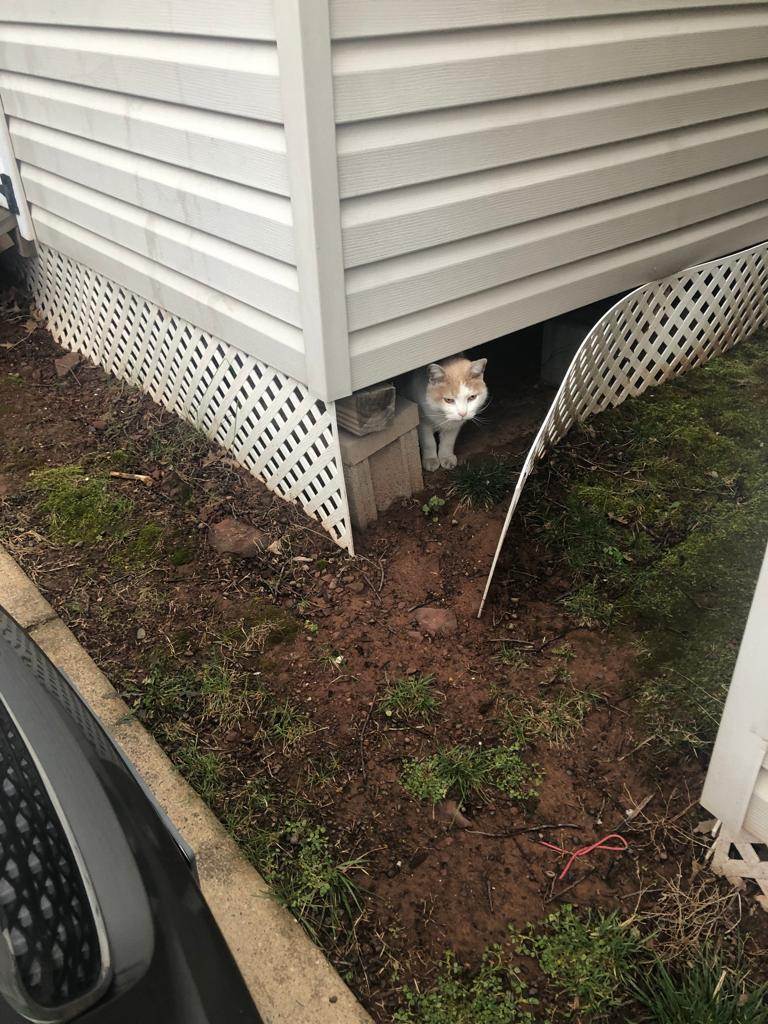
Boots before he was captured

By Liz Bresnahan
Fostering dogs has intrigued me for quite some time. Prior to adopting our dog, Finn, he was looked after by a foster family that devoted their time and energy to care for him until he was adopted. Of course we were very appreciative of their support and that Finn had a safe and loving home. Since then, our gratitude for Finn’s foster caregivers has only grown, as we started discovering just how crucial fosters are to helping animals get adopted.
The Humane Society of Loudoun County (HSLC), like other organizations that do not operate a shelter, relies heavily on its foster caregivers to open their hearts and homes to animals in need. While considering the opportunity of dog fostering, I was perusing HSLC’s website and noticed something that piqued my curiosity. A significant discrepancy exists between the number of cats that were fostered last year as compared to dogs. Specifically, while hundreds of cats were fostered (249 to be exact), there were only six dogs due to a severe shortage of dog fosters. I came to learn that this large gap is a pattern and not unique to 2022. To say I was surprised by this trend is an understatement, as it apparently has been for many people before me.
Knowing about the great need for dog fosters along with my desire to pay it forward for Finn, we embarked on the journey of dog fostering. Being brand new to this role, we knew that there was going to be a learning curve. Interestingly though, aspects of this transition have gone smoother than anticipated. Below are some takeaways from our experience fostering a dog named Lola.
Setting realistic expectations for ourselves and the dog has been crucial.
Going into fostering with the understanding that Lola’s behavior may vary as she adjusts to new circumstances has gone a long way. Also, acknowledging that we cannot possibly anticipate every situation that will arise has really helped with our peace of mind. Being patient and flexible are important.
Despite the short time period, growth is already evident.
There are many moments with Lola that bring so much joy – from settling into the crate more easily at bedtime to increased displays of affection to feeling safe enough to try new toys. These moments remind us why we are doing this in the first place. Lola can learn to built trust with us, and eventually her forever family, through our regular support and a consistent routine. This, in turn, will help prepare her for her new home.
Fostering allows you to receive support from an incredible community.
Since the beginning, fostering has been a rewarding experience due, in part, to the support of others. We have received assistance from various volunteers within HSLC to help manage logistical matters, promote Lola to potential adopters, and receive timely guidance and information about fostering. We have felt part of a network of people working together to improve the quality of life for animals who need us.

UPDATE: Lola was recently adopted by a wonderful family! Even though she was with us for just a few weeks, we had formed a connection with her. One of the reasons people may shy away from fostering is because they feel it would be too hard to part ways with the animal they have been caring for. It is difficult to say goodbye, that is for sure. But, seeing the joy that Lola brings to her new family is such a gratifying experience. It makes the experience 100% worth it.
There are many types of fostering opportunities available with HSLC, from short-term to long-term. To learn more, visit our website, or to discuss options, contact foster@humaneloudoun.org.

By Lauren Puckett
You’re looking for a new kitten. After weeks of searching, you find not one, but two – an adorable pair of baby black panthers named Maui and Ohana. Both boys are quite friendly with a wonderful purr, and you can’t wait to bring them home. The only thing that gives you pause are the adoption fees: $150 per kitten.
However, once you look into it, you realize these fees are actually a pretty good deal. The Humane Society of Loudoun County (HSLC) is paying to neuter, microchip, and vaccinate these kittens. The costs for these required services vary:
- $115 to $210 for vaccinations (Daily Paws)
- $100 to $400+ for neutering (MetLife Pet Insurance)
- $45 for microchipping (Daily Paws)
But even at the low end of those ranges, it adds up to $260 per kitten. And that’s just for the healthy animals. For older, sick or injured animals, additional services–including surgery–may cost thousands. It’s no wonder that HSLC paid an average of $1,063 per foster animal in 2022. However, as a completely volunteer-run, foster-based organization, we do not incur expenses to operate or staff a physical location.
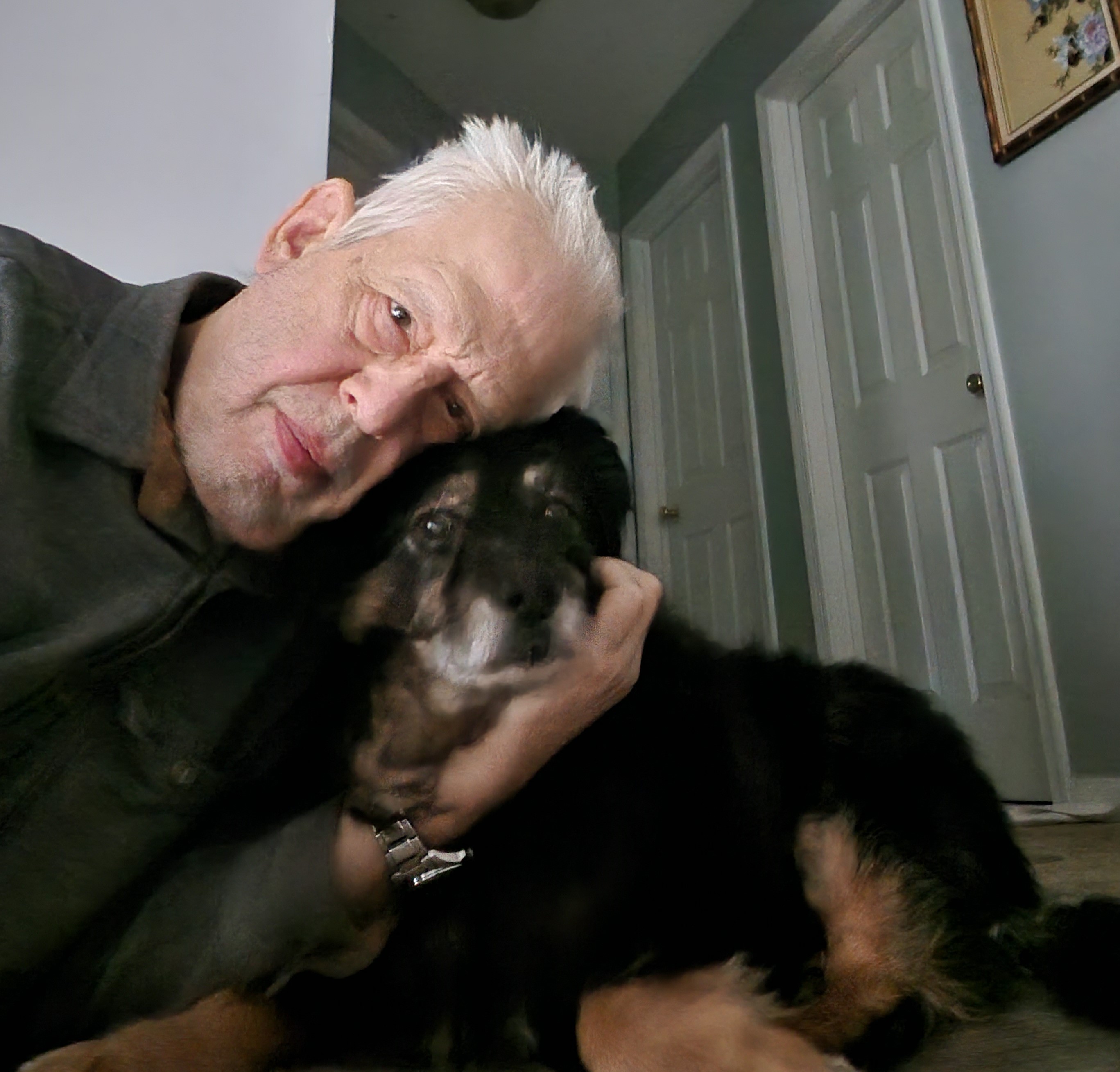
So, when you adopt from HSLC or other rescues, remember that the adoption fee is only covering a fraction of the actual expenses incurred. The remaining costs are covered by donations from caring individuals, businesses and foundations that support animal rescue.
Like other rescues, HSLC typically has higher adoption fees than local shelters because we do not receive funding from county, state or federal governments. HSLC’s adoption fees are on par with other non-profit rescues in the area.
Moreover, we’ve been able to keep our adoption fees – $150 per cat and $300 per dog – consistent for more than five years. This is due to the generosity of the community and because our veterinary partners continue to offer discounted services to HSLC even when faced with increasing costs.
To discover the many ways you can support HSLC’s life-saving mission, please visit our donate page. And, to adopt your next family member, visit our adoption page.
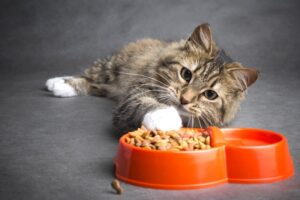
By Lauren Puckett
Eating is an essential part of living. But for our feline friends, it’s not always easy. Many cats can be picky eaters, while others tend to overeat. Over time, these issues can each lead to bigger health problems. Here’s what you can do if your cat is a difficult eater.
If Your Cat is a Picky Eater…
- Visit the Vet: First, make sure your cat is in good health. Visit the vet to rule out digestive problems, dental problems, and chronic illnesses such as inflammatory bowel disease or kidney disease.
- Try Different Textures: If your cat’s health is good, it may simply be that he or she doesn’t like the texture of food you’re providing. Try offering different textures –dry, canned, or semi-moist –and see if that jumpstarts eating. VCA Animal Hospitals advises, “For the semi-moist and canned food eaters, offer very small amounts at any one time. For a cat who is willing to eat dry, but just not all at once, it is reasonable to measure out the entire day’s portion all at once in the morning.”
- Increase the Appeal: Some human foods are safe to use on top of your cat’s food to increase its appeal. These include no-salt-added chicken or vegetable broth, fresh or frozen water-based vegetables such as broccoli, and dry scrambled eggs. Be sure to check with your veterinarian before trying these options and note that onions, garlic, leeks, scallions, shallots and chives are harmful to cats.
- Rule Out Environmental Factors: Cats can be fussy about their environment when eating. For instance, some don’t like an audience, while others may want to be stroked or even hand fed. Some cats are okay eating cold (wet) food, while others like their food warmed. Some cats don’t mind eating out of a dirty bowl, while others will only eat from a clean one (cleaning bowls is good practice anyway to avoid bacteria). Try changing different aspects of your cat’s environment to see if it makes a difference.
- Don’t Force a Schedule: Sometimes, the problem may be that your cat simply doesn’t like to eat on the mealtime schedule that you are offering. Some cats are grazers and eat when they feel like it. Try leaving food out beyond mealtime. However, refrain from doing this for canned food, as it may spoil.
If Your Cat Overeats…
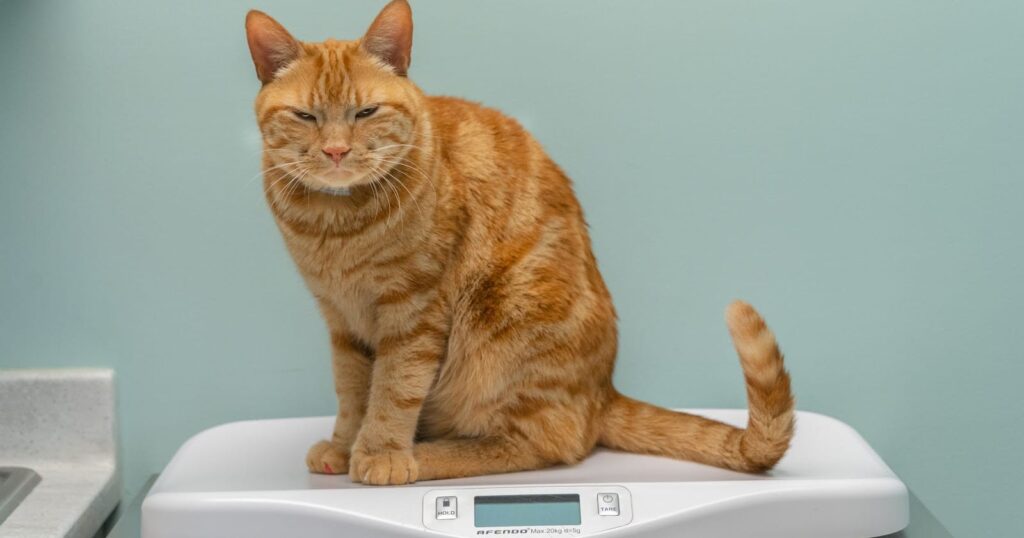
- Visit the Vet: Just like when your cat is a picky eater, overeating may be due to underlying health issues. These include diabetes, hyperthyroidism, parasites, and bowel problems. Rule these out first.
- Exercise Portion Control: In consultation with your vet, feed your cat measured portions at each meal (once or twice a day) and don’t leave food out between meals. Now, while this will help your cat lose weight, it may also lead to begging, which brings us to the next point…
- Don’t Give in to Begging: When your cat begs for food, he may just be bored or seeking your attention. Don’t give in by providing more food or a treat. Instead, get out your cat’s favorite toy and have a play session.
- Pay Attention to Nutrition: It’s possible that your cat’s food isn’t providing the nutrients he or she needs. Paw Tracks advises, “Consider switching to a higher quality cat food that provides them with the vitamins and minerals they need to be healthy.”
- Provide More Volume: You can actually add food to your cat’s meal, as long as it consists of water-based vegetables. These may include green beans, broccoli, or cauliflower, and they will make your cat feel fuller after eating. Just be sure to consult your vet first.
- Use Interactive Food Toys: If your cat eats too quickly, interactive food toys are a good solution. VCA Hospitals recommends, “One low-tech option is to use a muffin tin and place pieces of the cat’s kibble, or bites of his canned food, into each muffin holder.” You can also hide different portions of your cat’s meal around the house. Finally, you can buy an interactive food toy that releases a few kibbles at a time, or a slow cat feeder bowl shaped like a maze.
- Make Sure Your Cats Eat Separately: In multi-cat households, competition and food envy can be a problem and cause your cat to eat greedily. To combat this, feed your cats from their own bowls in different areas of your home.
If you would like to help feed cats in need,
become a Community Cat Caretaker or visit our Chewy wish list!
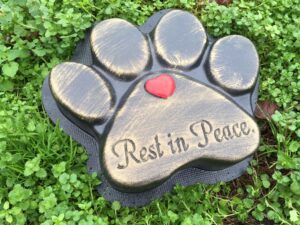
By Lauren Puckett
For most of us, losing a pet is like losing a member of the family. The sense of loss can be profound. As you go through the stages of grief, here are four ways to help you cope with the loss of your beloved companion.
1. Acknowledge your grief
It’s important to be open to your emotions, rather than ignoring them. Don’t try to “be strong” or push your sad thoughts aside. Rather, allow yourself to cry and acknowledge the loss. Work through your feelings and embrace the memories of your beloved pet. Don’t question your grief or compare it to the experience of losing a friend or relative. The American Veterinary Medical Association explains, “Your grief is normal, and the relationship you shared with your special friend needs to be mourned.”
2. Reach out to others
Seek support from your family and friends, especially those who have lost a pet themselves. You may also want to consult with your doctor or therapist. Additionally, the Humane Society of the United States recommends these resources for coping with the loss of a pet:
- The Pet Compassion Careline, which provides 24/7 support with trained grief counselors
- Lap of Love, which provides grief courses and pet loss support groups
- Everlife Support Groups, a directory of pet loss support groups by state
3. Maintain your routine
During a difficult time, you may not feel like eating or sleeping, but it’s important to take care of yourself. “Letting yourself get run down physically can make you feel worse emotionally,” explains ASPCA Pet Insurance. Maintaining your normal routine will help. If you have other pets, this is especially important for their well-being, too. Make sure to feed and walk them as usual.

4. Memorialize your pet
Do something to remember your pet, such as holding a funeral. HelpGuide.org notes, “A funeral can help you and your family members openly express your feelings. Ignore people who think it’s inappropriate to hold a funeral for a pet, and do what feels right for you.” Other ideas to memorialize your pet include:
- Spread your pet’s ashes or keep them in a special place in your home.
- Incorporate your pet’s ashes into pet cremation jewelry (try Spirit Pieces or Perfect Memorials).
- Plant a tree or shrub in honor of your pet. You can even have a memorial stone engraved and place it at the base.
- Create a memory box with your pet’s collar or favorite things.
- Share photos and memories online via social media or a specialized website (the Association for Pet Loss and Bereavement allows you to create one).
- Write a letter to your pet or the story of your last days together.
For immediate support, contact the Cornell University College of Veterinary Medicine’s Pet Loss Support Hotline at 607-218-7457, Monday through Friday, 6-9 p.m. EST and Saturday and Sunday, 12-9 pm EST.
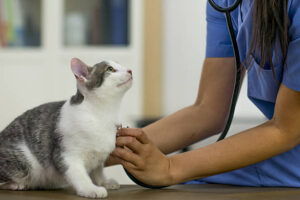
By Lauren Puckett
Let’s face it, nobody likes going to the vet, least of all cats. Anxious cats can be especially averse to the entire experience, from going into the cat carrier to riding in the car. Plus, indoor cat owners may not see the need to visit the vet because they think their cats are insulated from contagious diseases. But visiting the vet is vitally important to ensuring the health of your feline friend.
Small Door Veterinary explains, “Indoor cats can develop many illnesses and conditions that have nothing to do with the outside world, such as issues with weight, hormone problems, genetic conditions, and tumors, among other maladies, so it’s important for them to see the vet for regular check-ups.”
Here are 8 reasons to take your cat to the vet:
1. Wellness Exams
Did you know that healthy adult cats should visit the vet for wellness exams at least once a year, as recommended by the American Animal Hospital Association? Routine visits help the vet get to know your cat’s normal behaviors and weight. If there are fluctuations in these areas, the vet will be able to treat them early before they become major health issues. Once your cat reaches eight to 10 years old, you should visit the vet every six months.
2. Weight Management
Weight is a particularly important issue for indoor cats because they are often sedentary. The Cornell Feline Health Center notes that 40 percent of cats today fall into the obese category. Even a pound or two can make a difference in an animal as small as a cat. Being overweight makes your cat more susceptible to diabetes, heart disease, and arthritis. With regular visits to the vet, you can track your cat’s weight and detect any gains, then take the necessary action.
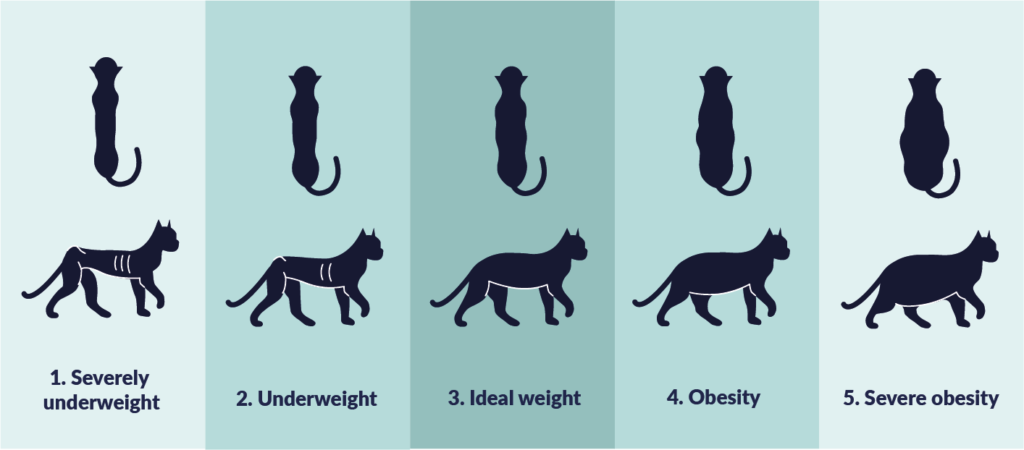
3. Vaccinations
As a kitten, your cat should see the vet frequently for vaccines. Once your cat is an adult, he or she will still need core vaccines every one to three years. These include the FVRCP, which protects against three airborne viruses. According to Pet MD, these diseases are widespread, highly contagious, and have the potential to be fatal. Rabies is the second core vaccine and is required by law in Virginia. A third vaccine, FeLV, protects again feline leukemia. It is considered core for kittens and optional for adult cats.
4. Flea and Tick Prevention
Flea and tick prevention should be a regular part of your routine, even for indoor cats. Saliva from fleas can cause severe allergies, dermatitis, anemia, itching, and infection, while tick bites can cause infection, abscesses, paralysis, and even death. Fleas and ticks can also transmit diseases to cats, including Lyme disease and Rocky Mountain Spotted Fever. Pet MD recommends using a monthly combination flea and tick preventative, either topical or oral, on your cat. If you do find an engorged tick on your cat, visit the vet immediately. According to Pet MD, “The ticks need to be removed in full, including all their mouth parts, to ensure there is no further toxin release.”
5. Worming
Regular treatment of cats to prevent or eliminate intestinal worms is important because most infected cats do not show signs of having worms. Worms can cause weight loss, vomiting and diarrhea, irritation around the anus, and failure to thrive. Even worse, they can be passed on to humans. All kittens are treated for roundworms, while tapeworms are more common in adult cats. International Cat Care recommends treating adult cats every one to three months with a product that is effective against both tapeworms and roundworms.
6. Dental Disease
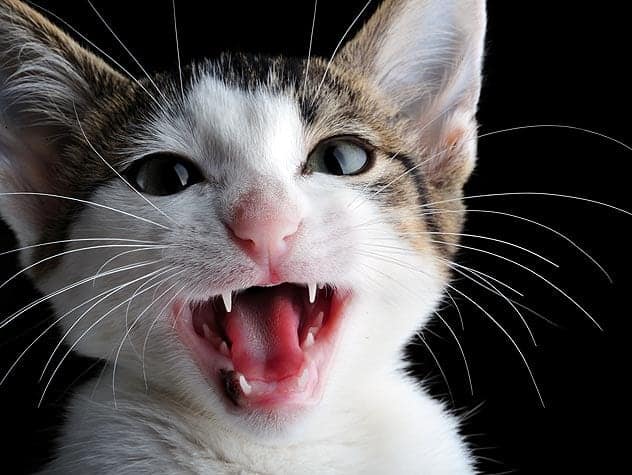
Dental disease is one of the most overlooked issues for cats. According to Small Door Veterinary, “Even with the best of diets, cats can develop a buildup of plaque on their teeth, as well as inflammation of their gums (gingivitis).” Dental disease can impact a cat’s quality of life due to pain and discomfort, and in many cases, causes a cat to stop eating. At routine checkups, your vet will do an oral examination to detect and treat any dental issues.
7. Urinary Tract Problems
Urinary tract problems affect one to three percent of cats each year, according to International Cat Care. Symptoms include the frequent urge to urinate, pain when urinating, blood in the urine, or the inability to pass more than a small amount of urine at a time. These problems are most common in middle-aged cats, neutered cats, overweight cats, cats that get little exercise, cats with little or no access to the outside, and cats that eat a dry diet.
8. Diabetes
Diabetes is a common disease in cats, according to Pet Health Network. It is a chronic condition in which the body either isn’t making enough insulin or isn’t responding to the insulin being produced. Typical symptoms include increased thirst and increased urination, but other symptoms include hunger, weight loss, lethargy, depression, and vomiting. Because these symptoms are similar to other diseases – such as liver or kidney disease, pancreatitis, and hyperthyroidism – it’s important to have your cat thoroughly examined by a vet.
For a list of top veterinarians in Northern Virginia, please visit this directory.
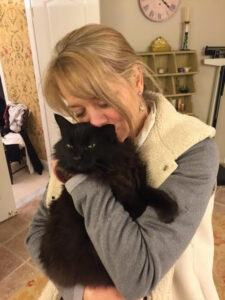
By Liz Bresnahan
Many thanks to our community!
Wicket Door Pub
Kristi and Mark Hanlon are co-owners of Wicket Door Pub, a family friendly establishment located in Ashburn. Due to their incredible generosity, the Humane Society of Loudoun County (HSLC) was featured in a full-page Giving Tuesday ad in the Loudoun Times which brought awareness about HSLC’s mission to the community. Kristi has fond memories of her family’s first dog when she was a child and attributes this special bond in helping shape the person she is today. In fact, Kristi has lived with rescued animals her entire life. Similarly, Mark grew up with Shelties and has been able to experience first-hand the love that animals can bring to a family.
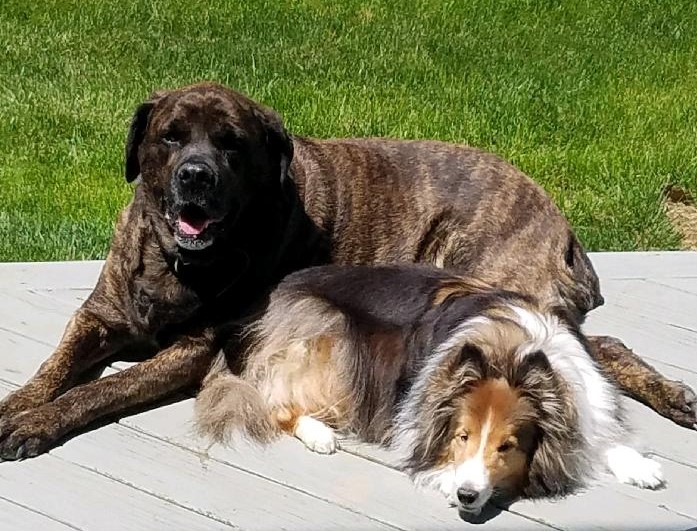
Kristi and Mark currently enjoy the company of their two dogs, Millie and Shay. The husband and wife team supports the efforts of HSLC, sharing that they “appreciate the hard work and time it takes to help lost and abandoned animals.” Next time you are in the area, check out this dog-friendly pub and ask about their menu just for dogs! HSLC is grateful for Wicket Door Pub’s gift certificate donation to this year’s auction.
Monica and Brian Spangler
Another couple who is devoted to helping animals, Monica and Brian Spangler have supported HSLC in a significant way. Monica, who works at Loudoun Cat Care and her husband Brian, a USA Today bestselling author, dedicated their time to supporting rescue organizations, including HSLC, by having a book-signing to help raise money during Robeks grand opening in Leesburg. Described as being a “huge fan” of HSLC’s mission, Monica and Brian have four cats, with Brian affectionately referring to them as his “co writers.”
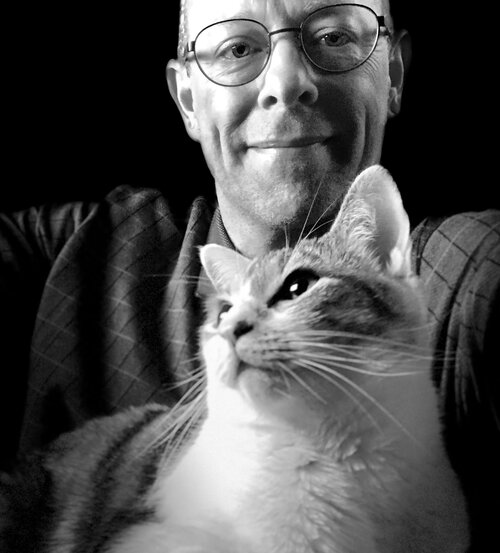
The Spangler’s family of cats consists of two calicos, who often sit with Brian as he is writing, and two senior Bengals that are both 18 years old, and despite their senior status, are extremely playful. Take the time to visit Brian’s website, B.R. Spangler. HSLC thanks him for donating four personally signed books to the auction which are paired with an Amazon gift card.
October One Vineyard
Loree Rupy is a dedicated cat colony caretaker for HSLC and she and her husband, Bob, are owners of October One Vineyard, known as O1V. Their wine tasting shop is located in Downtown Leesburg and they graciously host Yappy Hours in collaboration with HSLC on the last Friday of each month. Their love for animals is evident when you hear the care and detail in which Loree describes their rescued animals: two cats named Pepsi and Rosalita, and their dog, Becca. If you have visited O1V’s website, you likely have seen pictures of Becca as the vineyard’s mascot. While all three of their pets passed away this year within 90 days of one another, Loree and Bob feel comforted in the fact that they were able to live life to the fullest in their care, with each of their pets living to advanced ages. HSLC appreciates O1V’s wine tasting for two in-kind donation to the auction. O1V has been highlighted as a dog friendly business by Leesburg so stop by to say hello and bring your dog with you!

HSLC sincerely thanks all of the individuals and businesses who have donated in-kind products and services to the auction which will help raise much needed funding for the homeless and at-risk animals in our community.
